新人教版英语八年级上各单元知识点大归纳
- 格式:doc
- 大小:151.80 KB
- 文档页数:22

人教版八年级英语上册知识点总结归纳Unit1 Where did you goon vacation?【重点语法】不定代词:不指名代替任何特定名词或形容词的代词叫做不定代词。
用法注意1.some 和any+可数名/不可数名。
some 多用于肯定句,any多用于否定句、疑问句和条件从句。
有些问句中用some,不用any, 问话者希望得到对方肯定回答。
2. 由some, any, no,every 与body, one, thing构成的复合不定代词作主语时,其谓语动词用三单。
3. 不定代词若有定语修饰,该定语要置于其后:如:something interesting【重点短语】1. buy sth for ab./ buy sb. sth 为某人买某物2. taste + adj. 尝起来……3. nothing...but + V.(原形)除了……之外什么都没有4. seem + (to be) + adj 看起来5. arrive in + 大地方/ arrive at + 小地方到达某地6. decide to do sth. 决定做某事7. try doing sth. 尝试做某事/ try to do sth. 尽力做某事8. enjoy doing sth. 喜欢做某事9. want to do sth. 想去做某事10. start doing sth. 开始做某事=begin doing sth.11. stop doing sth. 停止做某事区分:stop to do sth. 停下来去做某事12. dislike doing sth. 不喜欢做某事14. so + adj + that + 从句如此……以至于……16. tell sb. (not) to do sth. 告诉某人(不要)做某事17. keep doing sth. 继续做某事18. forget to do sth. 忘记去做某事/ forget doing sth 忘记做过某事【词语辨析】1. take a photo/ take photos 拍照quite a few+名词复数“许多…”2. seem + 形容词看起来…... You seem happy today.seem + to do sth. 似乎/好像做某事I seem to have a coldIt seems + 从句似乎..…. It seems that no one believe you.seem like ... 好像,似乎….. It seems like a good idea.3. arrive in +大地点= get to= reach+地点名“到达......”arrive at +小地点(注:若后跟地点副词here/there/home, 介词需省略,如:arrive here; get home)4. feel like sth 感觉像…feel doing sth. 想要做某事5. wonder(想知道)+疑问词(who, what, why)引导的从句。
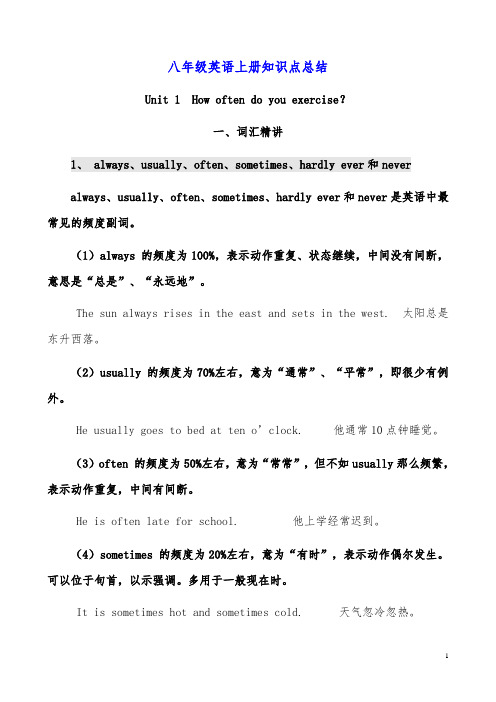
八年级英语上册知识点总结Unit 1 How often do you exercise?一、词汇精讲1、 always、usually、often、sometimes、hardly ever和neveralways、usually、often、sometimes、hardly ever和never是英语中最常见的频度副词。
(1)always 的频度为100%,表示动作重复、状态继续,中间没有间断,意思是“总是”、“永远地”。
The sun always rises in the east and sets in the west. 太阳总是东升西落。
(2)usually 的频度为70%左右,意为“通常”、“平常”,即很少有例外。
He usually goes to bed at ten o’clock. 他通常10点钟睡觉。
(3)often 的频度为50%左右,意为“常常”,但不如usually那么频繁,表示动作重复,中间有间断。
He is often late for school. 他上学经常迟到。
(4)sometimes 的频度为20%左右,意为“有时”,表示动作偶尔发生。
可以位于句首,以示强调。
多用于一般现在时。
It is sometimes hot and sometimes cold. 天气忽冷忽热。
Sometimes he does it this way and sometimes he does it that way.他有时这样做,有时那样做。
(5)hardly ever 的频度为5%左右,意为“几乎不”、“偶尔”,表频率,位置是“行前be后”。
I hardly ever go out these days. 这些天我几乎不出门。
(6)never 的频度为0,意为“从来不”、“永不”。
My parents are never late for work. 我父母上班从来不迟到。

八年级上册英语知识点归纳总结人教版一、单元一:一般现在时一般现在时用于描述经常或习惯性的动作,以及现在的状态。
例如:I often read books after school.(放学后我经常看书。
)二、单元二:一般过去时一般过去时用于描述过去发生的动作或状态。
例如:I read a book yesterday.(昨天我读了一本书。
)三、单元三:一般将来时一般将来时用于描述将来发生的动作或状态。
例如:I will read a book tomorrow.(明天我将读一本书。
)四、单元四:现在进行时现在进行时用于描述现在正在进行的动作。
例如:I am reading a book now.(我现在正在读书。
)五、单元五:现在完成时现在完成时用于描述从过去某个时间开始一直持续到现在的动作或状态。
例如:I have read three books this month.(本月我已经读了三本书。
)六、单元六:被动语态被动语态用于强调动作的承受者。
例如:A book is read by me.(一本书被我读了。
)七、单元七:情态动词情态动词用于表示可能性、建议、允许等含义。
例如:Can you read thisbook?(你能读这本书吗?)八、单元八:疑问句和回答疑问句用于询问信息,回答则是对疑问句的回应。
例如:- What do you read?- I read books.九、单元九:否定句和回答否定句是对肯定句的否定,回答则是对问题的回应。
例如:- You read a book,right?- No,I don"t.(不对,我没有读。
)十、单元十:祈使句和感叹句祈使句用于发出指令,感叹句用于表达感叹。
例如:- Read a book!- What a great book!通过以上十个单元的学习,我们希望同学们能够掌握英语时态的运用,以及情态动词、疑问句和回答等知识点,提高英语阅读和表达能力。
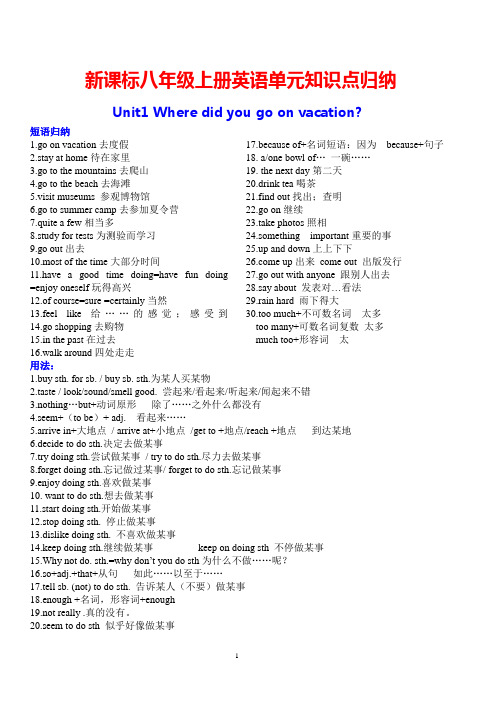
新课标八年级上册英语单元知识点归纳Unit1 Where did you go on vacation?短语归纳1.go on vacation去度假2.stay at home待在家里3.go to the mountains去爬山4.go to the beach去海滩5.visit museums 参观博物馆6.go to summer camp去参加夏令营7.quite a few相当多8.study for tests为测验而学习9.go out出去10.most of the time大部分时间11.have a good time doing=have fun doing =enjoy oneself玩得高兴12.of course=sure =certainly当然13.feel like给……的感觉;感受到14.go shopping去购物15.in the past在过去16.walk around四处走走17.because of+名词短语:因为because+句子18. a/one bowl of…一碗……19. the next day第二天20.drink tea喝茶21.find out找出;查明22.go on继续23.take photos照相24.something important重要的事25.up and down上上下下e up出来come out 出版发行27.go out with anyone 跟别人出去28.say about 发表对…看法29.rain hard 雨下得大30.too much+不可数名词太多too many+可数名词复数太多much too+形容词太用法:1.buy sth. for sb. / buy sb. sth.为某人买某物2.taste / look/sound/smell good. 尝起来/看起来/听起来/闻起来不错3.nothing…but+动词原形除了……之外什么都没有4.seem+(to be)+ adj. 看起来……5.arrive in+大地点/ arrive at+小地点/get to +地点/reach +地点到达某地6.decide to do sth.决定去做某事7.try doing sth.尝试做某事/ try to do sth.尽力去做某事8.forget doing sth.忘记做过某事/ forget to do sth.忘记做某事9.enjoy doing sth.喜欢做某事10. want to do sth.想去做某事11.start doing sth.开始做某事12.stop doing sth. 停止做某事13.dislike doing sth. 不喜欢做某事14.keep doing sth.继续做某事keep on doing sth 不停做某事15.Why not do. sth.=why don’t you do sth为什么不做……呢?16.so+adj.+that+从句如此……以至于……17.tell sb. (not) to do sth. 告诉某人(不要)做某事18.enough +名词,形容词+enough19.not really .真的没有。
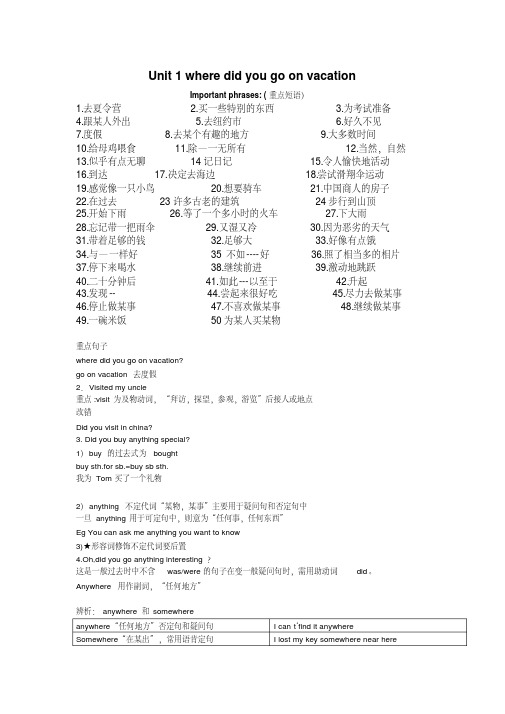
Unit 1 where did you go on vacationImportant phrases: (重点短语)1.去夏令营2.买一些特别的东西3.为考试准备4.跟某人外出5.去纽约市6.好久不见7.度假8.去某个有趣的地方9.大多数时间10.给母鸡喂食11.除—一无所有12.当然,自然13.似乎有点无聊14记日记15.令人愉快地活动16.到达17.决定去海边18.尝试滑翔伞运动19.感觉像一只小鸟20.想要骑车21.中国商人的房子22.在过去23许多古老的建筑24步行到山顶25.开始下雨26.等了一个多小时的火车27.下大雨28.忘记带一把雨伞29.又湿又冷30.因为恶劣的天气31.带着足够的钱32.足够大33.好像有点饿34.与—一样好35 不如----好36.照了相当多的相片37.停下来喝水38.继续前进39.激动地跳跃40.二十分钟后41.如此---以至于42.升起43.发现-- 44.尝起来很好吃45.尽力去做某事46.停止做某事47.不喜欢做某事48.继续做某事49.一碗米饭50为某人买某物重点句子where did you go on vacation?go on vacation 去度假2.Visited my uncle重点:visit为及物动词,“拜访,探望,参观,游览”后接人或地点改错Did you visit in china?3. Did you buy anything special?1)buy 的过去式为boughtbuy sth.for sb.=buy sb sth.我为Tom买了一个礼物2)anything 不定代词“某物,某事”主要用于疑问句和否定句中一旦anything用于可定句中,则意为“任何事,任何东西”Eg You can ask me anything you want to know3)★形容词修饰不定代词要后置4.Oh,did you go anything interesting?这是一般过去时中不含was/were的句子在变一般疑问句时,需用助动词did。
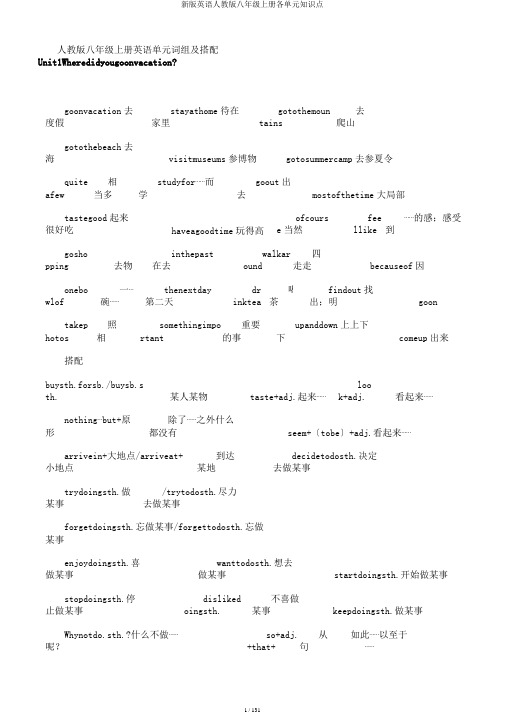
人教版八年级上册英语单元词组及搭配Unit1Wheredidyougoonvacation?goonvacation去度假stayathome待在家里gotothemountains去爬山gotothebeach去海visitmuseums参博物gotosummercamp去参夏令quite afew相当多studyfor⋯⋯而学goout出去mostofthetime大局部tastegood起来很好吃haveagoodtime玩得高ofcourse当然feellike⋯⋯的感;感受到goshopping去物inthepast在去walkaround四走走becauseof因onebo wlof一⋯碗⋯⋯thenextday第二天drinktea喝茶findout找出;明goontakep hotos照相somethingimportant重要的事upanddown上上下下comeup出来搭配buysth.forsb./buysb.sth.某人某物taste+adj.起来⋯⋯look+adj.看起来⋯⋯nothing⋯but+原形除了⋯⋯之外什么都没有seem+〔tobe〕+adj.看起来⋯⋯arrivein+大地点/arriveat+小地点到达某地decidetodosth.决定去做某事trydoingsth.做某事/trytodosth.尽力去做某事forgetdoingsth.忘做某事/forgettodosth.忘做某事enjoydoingsth.喜做某事wanttodosth.想去做某事startdoingsth.开始做某事stopdoingsth.停止做某事dislikedoingsth.不喜做某事keepdoingsth.做某事Whynotdo.sth.?什么不做⋯⋯呢?so+adj.+that+从句如此⋯⋯以至于⋯⋯tellsb.(not)todosth.告某人〔不要〕做某事语法:不定代词和一般过去时态Unit2Howoftendoyouexercise?词组helpwithhousework帮助做家onweekends在周末howoften多久一次hardlyever几乎从不onceaweek每周一次twiceamonth每月两次everyday每天befree有空gotothemovies去看影usetheInternet用互网swingdance舞playtennis打网球stayuplate熬夜;睡得很晚atleast至少havedanceandpianolessons上舞蹈和琴gotobedearly早点睡playsports行体育活begoodfor⋯⋯有好gocamping去野not⋯atall一点儿也不⋯⋯inone’sfreetime在某人的余themostpopular最受迎的suchas比方;如oldhabitsdiehard改gotothedentist去看牙医mornthan多于;超lessthan 少于搭配helpsb.withsth.帮助某人做某事Howabout⋯?......怎么?/⋯⋯好不好?wantsb.todosth.想某人做某事Howmany+可数名复数+一般疑句?⋯⋯有多少⋯⋯?主+find+that从句.⋯⋯⋯⋯spendtimewithsb.和某人一起度光It’s+adj.+to sthd.做某事的⋯⋯的。
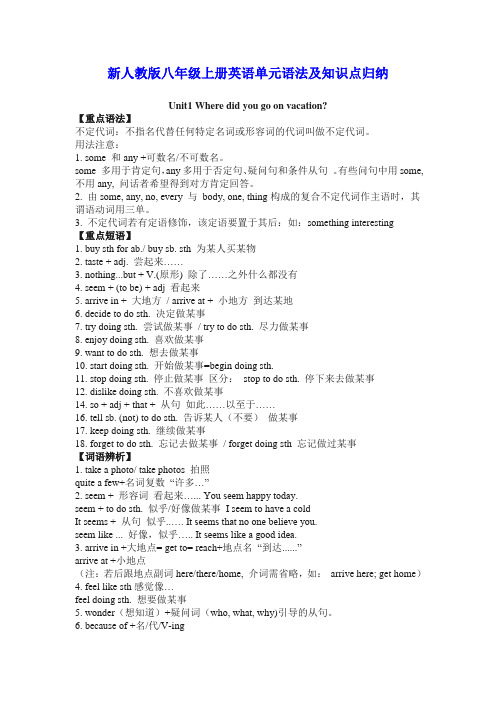
新人教版八年级上册英语单元语法及知识点归纳Unit1 Where did you go on vacation?【重点语法】不定代词:不指名代替任何特定名词或形容词的代词叫做不定代词。
用法注意:1. some 和any +可数名/不可数名。
some 多用于肯定句,any多用于否定句、疑问句和条件从句。
有些问句中用some,不用any, 问话者希望得到对方肯定回答。
2. 由some, any, no, every 与body, one, thing构成的复合不定代词作主语时,其谓语动词用三单。
3. 不定代词若有定语修饰,该定语要置于其后:如:something interesting【重点短语】1. buy sth for ab./ buy sb. sth 为某人买某物2. taste + adj. 尝起来……3. nothing...but + V.(原形) 除了……之外什么都没有4. seem + (to be) + adj 看起来5. arrive in + 大地方/ arrive at + 小地方到达某地6. decide to do sth. 决定做某事7. try doing sth. 尝试做某事/ try to do sth. 尽力做某事8. enjoy doing sth. 喜欢做某事9. want to do sth. 想去做某事10. start doing sth. 开始做某事=begin doing sth.11. stop doing sth. 停止做某事区分:stop to do sth. 停下来去做某事12. dislike doing sth. 不喜欢做某事14. so + adj + that + 从句如此……以至于……16. tell sb. (not) to do sth. 告诉某人(不要)做某事17. keep doing sth. 继续做某事18. forget to do sth. 忘记去做某事/ forget doing sth 忘记做过某事【词语辨析】1. take a photo/ take photos 拍照quite a few+名词复数“许多…”2. seem + 形容词看起来…... You seem happy today.seem + to do sth. 似乎/好像做某事I seem to have a coldIt seems + 从句似乎..…. It seems that no one believe you.seem like ... 好像,似乎….. It seems like a good idea.3. arrive in +大地点= get to= reach+地点名“到达......”arrive at +小地点(注:若后跟地点副词here/there/home, 介词需省略,如:arrive here; get home)4. feel like sth 感觉像…feel doing sth. 想要做某事5. wonder(想知道)+疑问词(who, what, why)引导的从句。
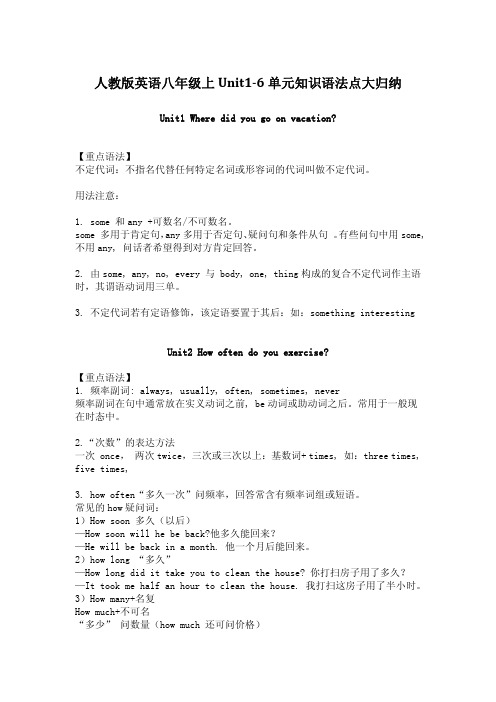
人教版英语八年级上Unit16单元知识语法点大归纳Unit1 Where did you go on vacation?【重点语法】不定代词:不指名代替任何特定名词或形容词的代词叫做不定代词。
用法注意:1. some 和any +可数名/不可数名。
some 多用于肯定句,any多用于否定句、疑问句和条件从句 。
有些问句中用some,不用any, 问话者希望得到对方肯定回答。
2. 由some, any, no, every 与 body, one, thing构成的复合不定代词作主语时,其谓语动词用三单。
3. 不定代词若有定语修饰,该定语要置于其后:如:something interestingUnit2 How often do you exercise?【重点语法】1. 频率副词: always, usually, often, sometimes, never频率副词在句中通常放在实义动词之前, be动词或助动词之后。
常用于一般现在时态中。
2.“次数”的表达方法一次 once, 两次twice,三次或三次以上:基数词+ times, 如:three times, five times,3. how often“多久一次”问频率,回答常含有频率词组或短语。
常见的how疑问词:1)How soon 多久(以后)—How soon will he be back?他多久能回来?—He will be back in a month. 他一个月后能回来。
2)how long “多久”—How long did it take you to clean the house? 你打扫房子用了多久? —It took me half an hour to clean the house. 我打扫这房子用了半小时。
3)How many+名复How much+不可名“多少” 问数量(how much 还可问价格)Unit3 I’m more outgoing than my sister.【重点语法】1. 形容词和副词的比较等级(1)形容词和副词的原形就是原级(2)比较级,表示较……或更……(3)最高级, 表示最...。
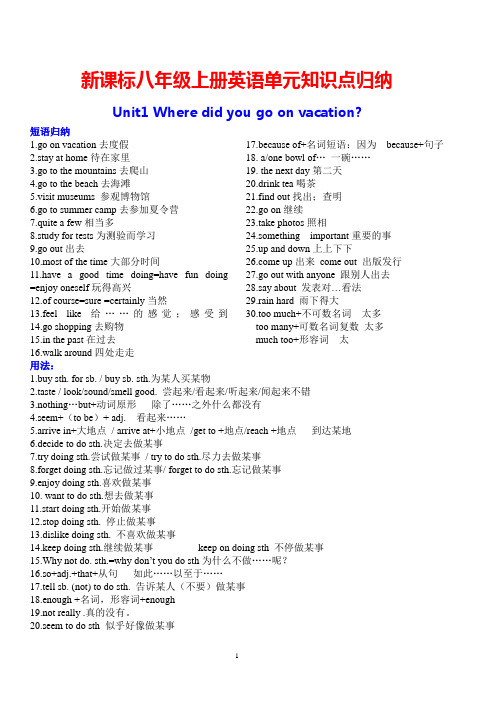
新课标八年级上册英语单元知识点归纳Unit1 Where did you go on vacation?短语归纳1.go on vacation去度假2.stay at home待在家里3.go to the mountains去爬山4.go to the beach去海滩5.visit museums 参观博物馆6.go to summer camp去参加夏令营7.quite a few相当多8.study for tests为测验而学习9.go out出去10.most of the time大部分时间11.have a good time doing=have fun doing =enjoy oneself玩得高兴12.of course=sure =certainly当然13.feel like给……的感觉;感受到14.go shopping去购物15.in the past在过去16.walk around四处走走17.because of+名词短语:因为because+句子18. a/one bowl of…一碗……19. the next day第二天20.drink tea喝茶21.find out找出;查明22.go on继续23.take photos照相24.something important重要的事25.up and down上上下下e up出来come out 出版发行27.go out with anyone 跟别人出去28.say about 发表对…看法29.rain hard 雨下得大30.too much+不可数名词太多too many+可数名词复数太多much too+形容词太用法:1.buy sth. for sb. / buy sb. sth.为某人买某物2.taste / look/sound/smell good. 尝起来/看起来/听起来/闻起来不错3.nothing…but+动词原形除了……之外什么都没有4.seem+(to be)+ adj. 看起来……5.arrive in+大地点/ arrive at+小地点/get to +地点/reach +地点到达某地6.decide to do sth.决定去做某事7.try doing sth.尝试做某事/ try to do sth.尽力去做某事8.forget doing sth.忘记做过某事/ forget to do sth.忘记做某事9.enjoy doing sth.喜欢做某事10. want to do sth.想去做某事11.start doing sth.开始做某事12.stop doing sth. 停止做某事13.dislike doing sth. 不喜欢做某事14.keep doing sth.继续做某事keep on doing sth 不停做某事15.Why not do. sth.=why don’t you do sth为什么不做……呢?16.so+adj.+that+从句如此……以至于……17.tell sb. (not) to do sth. 告诉某人(不要)做某事18.enough +名词,形容词+enough19.not really .真的没有。
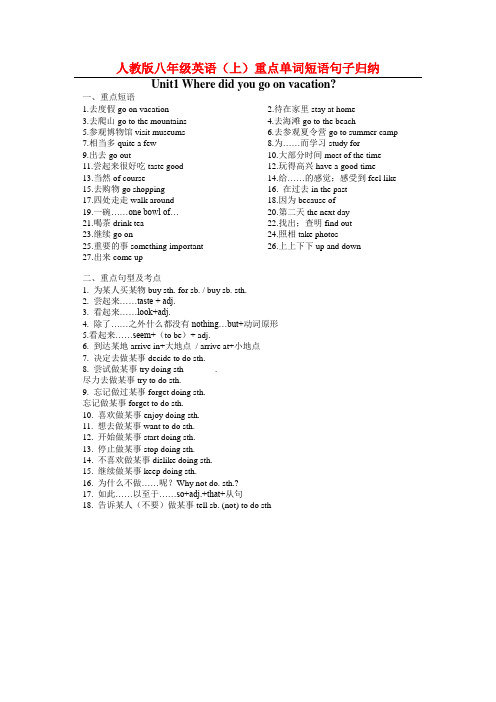
人教版八年级英语(上)重点单词短语句子归纳Unit1 Where did you go on vacation?一、重点短语1.去度假go on vacation2.待在家里stay at home3.去爬山go to the mountains4.去海滩go to the beach5.参观博物馆visit museums6.去参观夏令营go to summer camp7.相当多quite a few8.为……而学习study for9.出去go out 10.大部分时间most of the time 11.尝起来很好吃taste good 12.玩得高兴have a good time13.当然of course 14.给……的感觉;感受到feel like 15.去购物go shopping 16. 在过去in the past17.四处走走walk around 18.因为because of19.一碗……one bowl of… 20.第二天the next day21.喝茶drink tea 22.找出;查明find out23.继续go on 24.照相take photos25.重要的事something important 26.上上下下up and down27.出来come up二、重点句型及考点1. 为某人买某物buy sth. for sb. / buy sb. sth.2. 尝起来……taste + adj.3. 看起来……look+adj.4. 除了……之外什么都没有nothing…but+动词原形5.看起来……seem+(to be)+ adj.6. 到达某地arrive in+大地点/ arrive at+小地点7. 决定去做某事decide to do sth.8. 尝试做某事try doing sth .尽力去做某事try to do sth.9. 忘记做过某事forget doing sth.忘记做某事forget to do sth.10. 喜欢做某事enjoy doing sth.11. 想去做某事want to do sth.12. 开始做某事start doing sth.13. 停止做某事stop doing sth.14. 不喜欢做某事dislike doing sth.15. 继续做某事keep doing sth.16. 为什么不做……呢?Why not do. sth.?17. 如此……以至于……so+adj.+that+从句18. 告诉某人(不要)做某事tell sb. (not) to do sthUnit 2 How often do you exercise?一、根据汉语写短语。
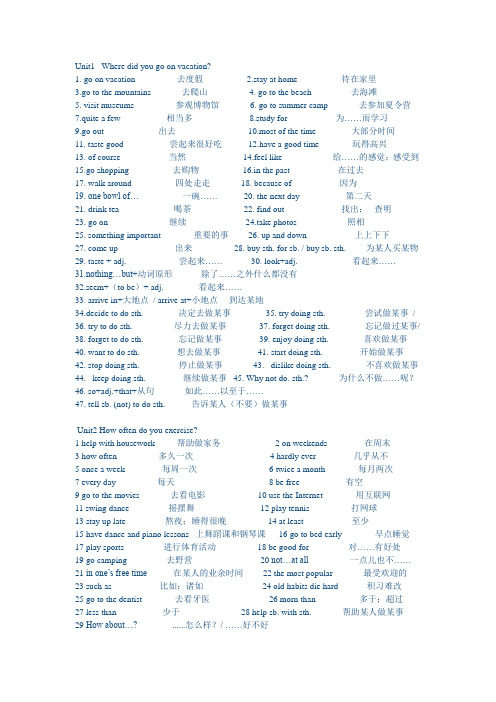
Unit1 Where did you go on vacation?1. go on vacation 去度假2.stay at home 待在家里3.go to the mountains 去爬山4. go to the beach 去海滩5. visit museums 参观博物馆6. go to summer camp 去参加夏令营7.quite a few 相当多8.study for 为……而学习9.go out 出去10.most of the time 大部分时间11. taste good 尝起来很好吃12.have a good time 玩得高兴13. of course 当然14.feel like 给……的感觉;感受到15.go shopping 去购物16.in the past 在过去17. walk around 四处走走18. because of 因为19. one bowl of…一碗……20. the next day 第二天21. drink tea 喝茶22. find out 找出;查明23. go on 继续24.take photos 照相25. something important 重要的事26. up and down 上上下下27. come up 出来28. buy sth. for sb. / buy sb. sth. 为某人买某物29. taste + adj. 尝起来……30. look+adj. 看起来……31.nothing…but+动词原形除了……之外什么都没有32.seem+(to be)+ adj. 看起来……33. arrive in+大地点/ arrive at+小地点到达某地34.decide to do sth. 决定去做某事35. try doing sth. 尝试做某事/ 36. try to do sth. 尽力去做某事37. forget doing sth. 忘记做过某事/ 38. forget to do sth. 忘记做某事39. enjoy doing sth. 喜欢做某事40. want to do sth. 想去做某事41. start doing sth. 开始做某事42. stop doing sth. 停止做某事43. dislike doing sth. 不喜欢做某事44. keep doing sth. 继续做某事45. Why not do. sth.? 为什么不做……呢?46. so+adj.+that+从句如此……以至于……47. tell sb. (not) to do sth. 告诉某人(不要)做某事Unit2 How often do you exercise?1 help with housework 帮助做家务2 on weekends 在周末3 how often 多久一次4 hardly ever 几乎从不5 once a week 每周一次6 twice a month 每月两次7 every day 每天8 be free 有空9 go to the movies 去看电影10 use the Internet 用互联网11 swing dance 摇摆舞12 play tennis 打网球13 stay up late 熬夜;睡得很晚14 at least 至少15 have dance and piano lessons 上舞蹈课和钢琴课16 go to bed early 早点睡觉17 play sports 进行体育活动18 be good for 对……有好处19 go camping 去野营20 not…at all一点儿也不……21 in one’s free time在某人的业余时间22 the most popular 最受欢迎的23 such as 比如;诸如24 old habits die hard 积习难改25 go to the dentist 去看牙医26 morn than 多于;超过27 less than 少于28 help sb. with sth. 帮助某人做某事29 How about…?......怎么样?/ ……好不好30 want sb. to do sth. 想让某人做某事31 How many+可数名词复数+一般疑问句?……有多少……?32 主语+find+that从句. ……发现……33 spend time with sb. 和某人一起度过时光34 It’s+ adj.+ to do sth.做某事的……的。
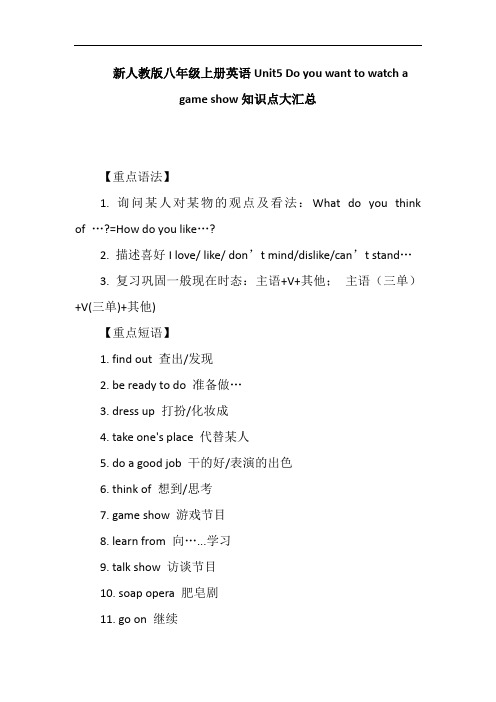
新人教版八年级上册英语Unit5 Do you want to watch agame show知识点大汇总【重点语法】1. 询问某人对某物的观点及看法:What do you think of …?=How do you like…?2. 描述喜好I love/ like/ don’t mind/dislike/can’t stand…3. 复习巩固一般现在时态:主语+V+其他;主语(三单)+V(三单)+其他)【重点短语】1. find out 查出/发现2. be ready to do 准备做…3. dress up 打扮/化妆成4. take one's place 代替某人5. do a good job 干的好/表演的出色6. think of 想到/思考7. game show 游戏节目8. learn from 向…...学习9. talk show 访谈节目10. soap opera 肥皂剧11. go on 继续12. watch a movie 看电影13. one of…其中之一14. try one’s best to =do one’s best to 竭尽全力15. a pair of 一双16. as famous as 一样闻名/出名17. look like 看起来像18. around the world 世界各地19. have a discussion about 讨论…...20. one day 有一天/某一天21. such as 例如22. a symbol of 一个象征/标志23. something enjoyable 快乐的事情24. interesting information 有趣的信息【词语辨析】1. want + n 想要……want to do sth 想要做某事want sb to do sth 想让某人做某事……2. mind 介意,其后+名词/代词/V-ing3. stand1)“站, 站立” e.g. Stand up! 起立2) “忍受”(多用于否定句、疑问句) , 后可+名/代/V-ing 4. plan vt. & vi.计划, 打算,plan to do sth.plan 还可作名词,如:make plans 制定计划5. v. discuss (讨论) + ion→n. discussionhad a discussion about sth. 对某事进行讨论6. happen v. 发生; 出现sth+ happens to sb.”或“sth happened + 时间/地点”句式7. 情态动词may 语气弱于can,意为“可能”might 表推测,语气最弱,意为“可能”may/might not 表示否定推测时语气最弱,意为“可能不”They may not be very exciting. 它们可能不是那么令人兴奋。
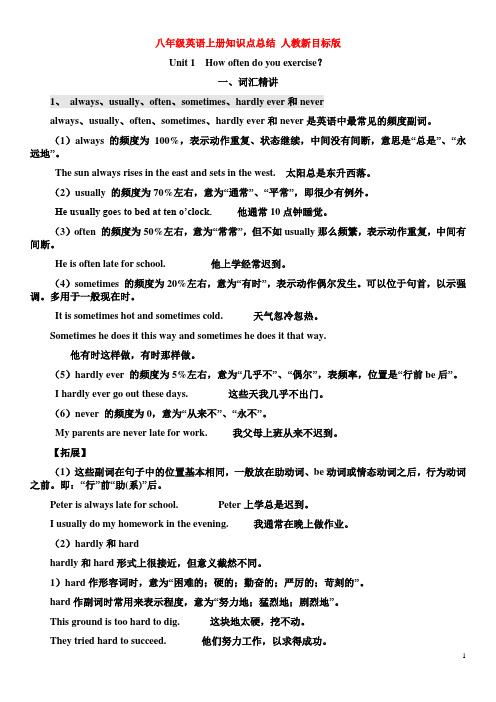
八年级英语上册知识点总结人教新目标版Unit 1 How often do you exercise?一、词汇精讲1、always、usually、often、sometimes、hardly ever和neveralways、usually、often、sometimes、hardly ever和never是英语中最常见的频度副词。
(1)always 的频度为100%,表示动作重复、状态继续,中间没有间断,意思是“总是”、“永远地”。
The sun always rises in the east and sets in the west. 太阳总是东升西落。
(2)usually 的频度为70%左右,意为“通常”、“平常”,即很少有例外。
He usually goes to bed at ten o’clock. 他通常10点钟睡觉。
(3)often 的频度为50%左右,意为“常常”,但不如usually那么频繁,表示动作重复,中间有间断。
He is often late for school. 他上学经常迟到。
(4)sometimes 的频度为20%左右,意为“有时”,表示动作偶尔发生。
可以位于句首,以示强调。
多用于一般现在时。
It is sometimes hot and sometimes cold. 天气忽冷忽热。
Sometimes he does it this way and sometimes he does it that way.他有时这样做,有时那样做。
(5)hardly ever 的频度为5%左右,意为“几乎不”、“偶尔”,表频率,位置是“行前be后”。
I hardly ever go out these days. 这些天我几乎不出门。
(6)never 的频度为0,意为“从来不”、“永不”。
My parents are never late for work. 我父母上班从来不迟到。
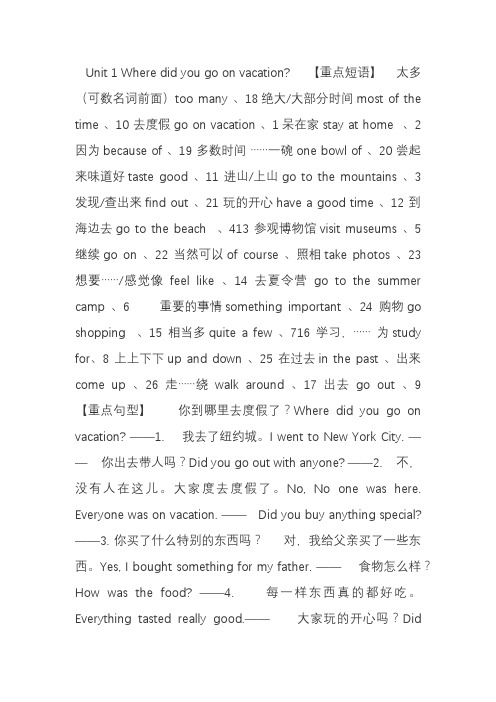
Unit 1 Where did you go on vacation? 【重点短语】太多(可数名词前面)too many 、18绝大/大部分时间most of the time 、10 去度假go on vacation 、1呆在家stay at home 、2 因为because of 、19 多数时间……一碗one bowl of 、20 尝起来味道好taste good 、11 进山/上山go to the mountains 、3 发现/查出来find out 、21 玩的开心have a good time 、12 到海边去go to the beach 、413 参观博物馆visit museums 、5 继续go on 、22 当然可以of course 、照相take photos 、23 想要……/感觉像feel like 、14 去夏令营go to the summer camp 、6 重要的事情something important 、24 购物go shopping 、15 相当多quite a few 、716 学习,…… 为study for、8 上上下下up and down 、25 在过去in the past 、出来come up 、26 走……绕walk around 、17 出去go out 、9 【重点句型】你到哪里去度假了?Where did you go on vacation? ——1. 我去了纽约城。
I went to New York City. ——你出去带人吗?Did you go out with anyone? ——2. 不,没有人在这儿。
大家度去度假了。
No, No one was here. Everyone was on vacation. —— Did you buy anything special? ——3. 你买了什么特别的东西吗?对,我给父亲买了一些东西。

新人教版八年级上册英语单元语法及知识点归纳Unit1 Where did you go on vacation?【重点语法】不定代词:不指名代替任何特定名词或形容词的代词叫做不定代词。
用法注意:1. some 和any +可数名/不可数名。
some 多用于肯定句,any多用于否定句、疑问句和条件从句。
有些问句中用some,不用any, 问话者希望得到对方肯定回答。
2. 由some, any, no, every 与body, one, thing构成的复合不定代词作主语时,其谓语动词用三单。
3. 不定代词若有定语修饰,该定语要置于其后:如:something interesting【重点短语】1. buy sth for ab./ buy sb. sth 为某人买某物2. taste + adj. 尝起来……3. nothing...but + V.(原形) 除了……之外什么都没有4. seem + (to be) + adj 看起来5. arrive in + 大地方/ arrive at + 小地方到达某地6. decide to do sth. 决定做某事7. try doing sth. 尝试做某事/ try to do sth. 尽力做某事8. enjoy doing sth. 喜欢做某事9. want to do sth. 想去做某事10. start doing sth. 开始做某事=begin doing sth.11. stop doing sth. 停止做某事区分:stop to do sth. 停下来去做某事12. dislike doing sth. 不喜欢做某事14. so + adj + that + 从句如此……以至于……16. tell sb. (not) to do sth. 告诉某人(不要)做某事17. keep doing sth. 继续做某事18. forget to do sth. 忘记去做某事/ forget doing sth 忘记做过某事【词语辨析】1. take a photo/ take photos 拍照quite a few+名词复数“许多…”2. seem + 形容词看起来…... You seem happy today.seem + to do sth. 似乎/好像做某事I seem to have a coldIt seems + 从句似乎..…. It seems that no one believe you.seem like ... 好像,似乎….. It seems like a good idea.3. arrive in +大地点= get to= reach+地点名“到达......”arrive at +小地点(注:若后跟地点副词here/there/home, 介词需省略,如:arrive here; get home)4. feel like sth 感觉像…feel doing sth. 想要做某事5. wonder(想知道)+疑问词(who, what, why)引导的从句。
八年级上册英语各单元知识点大归纳Unit 1 Where did you go on vacation?【语法解析】不定代词:不指名代替任何特定名词或形容词的代词叫做不定代词。
用法注意:1. some 和any +可数名/不可数名。
some 多用于肯定句,any多用于否定句、疑问句和条件从句。
有些问句中用some,不用any, 问话者希望得到对方肯定回答。
2. 由some, any, no, every 构成的复合不定代词作主语时,其谓语动词用第三单3. 不定代词若有定语修饰,该定语要置于其后:如:something interesting二、知识点:1. buy sth for ab./ buy sb. sth 为某人买某物2. taste + adj. 尝起来……3. nothing ….but + V.(原形) 除了……之外什么都没有4. seem + (to be) + adj 看起来5. arrive in + 大地方 / arrive at + 小地方到达某地6. decide to do sth. 决定做某事7. try doing sth. 尝试做某事 / try to do sth. 尽力做某事8. enjoy doing sth. 喜欢做某事 9. want to do sth. 想去做某事10. start doing sth. 开始做某事=begin doing sth.11. stop doing sth. 停止做某事区分: stop to do sth. 停下来去做某事12. dislike doing sth. 不喜欢做某事14. so + adj + that + 从句如此……以至于……16. tell sb. (not) to do sth. 告诉某人(不要)做某事17. keep doing sth. 继续做某事18. forget to do sth. 忘记去做某事 / forget doing sth 忘记做过某事词语辨析:1. take a photo/ take photos 拍照quite a few+名词复数“许多…”2. seem 形容词看起来….. You seem happy today.to do sth. 似乎、好像做某事 I seem to have a coldIt seems + 从句似乎…. It seems that no one believe you.seem like ….好像,似乎….. It seems like a good idea.3. arrive in +大地点, = get to= reach+地点名“到达...”arrive at +小地点(注:若后跟地点副词here/there/home, 介词需省略,如: arrive here; get home)4. feel like sth/ doing sth. 感觉像是…5. wonder “想知道”,+疑问词(who, what, why)引导的从句。
6. because of +名/代/V-ingBecause+从句,表示直接明确的原因或理由。
He can’t take a walk because of the rain.I don’t buy the shirt because it was too expensive.7. enough +名词“足够…”形容词/副词+enoughUnit2 How often do you exercise?【语法解析】1.频率副词: always, usually, often, sometimes, never频率副词在句中通常放在实义动词之前, be动词或助动词之后。
常用于一般现在时态中2.“次数”的表达方法一次once,两次twice,三次或三次以上用基数词+ times, three times, five times, 3、how often“多久一次”问频率,回答常含有频率词组或短语。
常见的how疑问词:1)How soon多久(以后)—How soon will he be back?他多久能回来?—He will be back in a month. 他一个月后能回来。
2)how long “多久”,eg.—How long did it take you to clean the house? 你打扫房子用了多久?—It took me half an hour to clean the house. 我打扫这房子用了半小时。
3)How many+名复/How much+不可名“多少”问数量(how much 还可问价格)二、知识点:1. go to the movies 去看电影2. look after = take care of 照顾3. surf the internet 上网4. healthy lifestyle 健康的生活方式5. go skate boarding 去划板6. keep healthy=stay healthy 保持健康7. eating habits 饮食习惯8. take more exercise 做更多的运动9. the same as 与什么相同 10. be different from 不同11. once a month一月一次 12. twice a week一周两次13.make a difference to 对什么有影响 14. most of the students=most student15.shop=go shopping=do some shopping 购物 16. be good for 对什么有益 17. be bad for对什么有害 18. come home from school放学回家19 .of course = certainly = sure当然 20. get good grades取得好成绩21. keep/be in good health保持健康 22. take a vacation 去度假【词语辨析】一、maybe / may be1. The baby is crying she is hungry.2. The woman a teacher .maybe 是副词,意为“大概,可能,或许”,一般用于句首。
May be是情态动词,意为“可能是..,也许是..,大概是..”.二、1)a few / few / a little / little1. people can live to 100,but people can live to 150.2. There is time left, I don’t catch the first bus.3. Could you give me milk?2)、hard / hardly1. The ground is too to dig2. I can understand them.3. It’s raining ,the people can go outside.hard作形容词,意为“困难的,艰苦的,硬的”;作副词,意为“努力地,猛烈地”。
Hardly意为“几乎不”。
4. As for homework , most students do homework every day .as for...意思是“至于;关于”,+名词、代词或动词的-ing形式(即动名词)。
如: As for him,I never want to see him here. 至于他,我永远不希望在这里见到。
As for the story,you'd better not believe it. 关于那故事,你最好不要相信。
5.. That sounds interesting.这是“主语+系动词+表语”结构的简单句。
sound(听起来),look(看起来),smell(闻起来),taste(尝起来),feel(觉得),seem(好象),grow(变得),get(变得)等词在英语中可用作系动词,后跟形容词作表语。
如:It tastes good. 这味道好。
The music sounds very sweet. 这音乐听起来很入耳。
The smoke grew heavier and heavier. 烟雾变得越来越浓了。
2. Be about(介词)“是关于…”+名/代/V-ing4.Here be is+名单:Here is a photo of my family.“这是…” are +名复:Here are some books.5.find(found)+that从句:发现…Eg:I found that most students go to school by bike.6.percent 名词,意为“百分之……”百分数用基数+ percent (不用复数形式),percent做主语时,谓语动词的数要根据其后面的名词来确定e.g. 50% fifty percent 百分之五十Fifty percent of the apples are bad. 50%的苹果都坏了。
Twenty percent of the meat is in the fridge.20%的肉都在冰箱7.not … at all 意为“一点也不”. not应放在be动词、情态动词或助动词之后。
e.g. The story isn’t interesting at all. 那个故事一点也没有趣。
8. It is + adj. to do sth. 干某事是……例如: It is interesting to play computer games. 玩电脑很有趣。
9.the best way to do sth.做某事的最好方式e.g. The best way to learn English is through more practice10. take, spend, payIt takes sb. some time to do sth. 意为“花费某人……时间来做某事”。
人(sb.) spend 时间/钱 on sth. “买某物花了……钱”。
(in) doing “花费多少时间来做某事”。
pay 的主语必须是人,而“花钱买某物”为pay … for11.however 副词,意为“然而,可是”,表示转折关系,可放在句首、句中、句末Unit3 I’m more outgoing than my sister.【语法解析】形容词比较级1.形容词的原形就是原级,2.比较级,表示较……或更……3.最高级,表示最...。